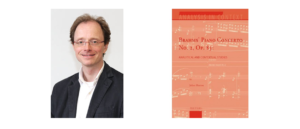Keynote Speaker: Julian Horton

“Brahms and the Theory of Romantic Form”
Friday 1 February, 5.30–6.30, Winifred Smith Hall
Nineteenth-century instrumental forms have, until comparatively recently, lived much in the shadow of their eighteenth-century forebears. The discourse on sonata form in particular has assumed the priority of Haydn, Mozart and Beethoven: theorists, historians and critics have long promulgated Viennese classicism’s centrality for the sonata-type repertoire, and have accordingly side-lined nineteenth-century examples as imperfect postscripts to a perfected style. Brahms has fared better than most in this regard: yet his acknowledged mastery of sonata form is often considered a late outlier, which confirms by constitutive opposition the general Romantic preference for theatrical, poetic or programmatic practices over the absolute forms of symphony, quartet and sonata.
The last decade has witnessed a surge of revisionist thought on this subject. In particular, theorists have explored fresh approaches to Romantic sonata forms’ thematic syntax: that is, to the grouping structures underpinning thematic organisation. My paper considers this research’s relevance for Brahms, drawing on my own work in this area (2017 and 2018) and the contributions of Schmalfeldt (2011), Vande Moortele (2009 and 2017), McClelland (2009), Smith (2001, 2005 and 2016), Hepokoski (2012), Monahan (2011) and Davis (2014). Specifically, I offer a corpus study of main- and subordinate-theme syntax in Brahms’s first-movement sonata forms, the implications of which are pursued in depth in an analysis of the first movement of the Double Concerto, Op. 102. My conclusions situate Brahms’s sonata practice within a broader attempt to advocate for the historical centrality of nineteenth-century sonata forms.
Julian Horton is the author of Brahms’ Second Piano Concerto, Op. 83: Analytical and Contextual Studies, Analysis in Context IV (Leuven: Peeters, 2017). This book constitutes the first analytical monograph on Brahms’s Op. 83 in the English language. It contextualises analysis of the work in relation to Brahms’s concept of the concerto, the development of the genre from Mozart to Schoenberg, problems in the theory of post-classical form, and interpretative questions of meaning and social function.
Professor Horton’s research focuses on the analysis and reception of nineteenth-century instrumental music, with special interests in the music of Brahms and Bruckner, the analysis of sonata form, and the theory of tonality. His books include Bruckner’s Symphonies: Analysis, Reception and Cultural Politics (Cambridge University Press, 2004). He is editor of The Cambridge Companion to the Symphony (2013) and Schubert (Routledge 2015), and co-editor with Lorraine Byrne Bodley of Schubert’s Late Music: History, Theory, Style (Cambridge University Press 2016) and Rethinking Schubert (Oxford University Press 2016). His article “John Field and the Alternative History of Concerto First-Movement Form” (2011) was awarded the Westrup Prize of the Music and Letters Trust. In 2014, he was elected President of the Society for Music Analysis. In 2015, he was elected to the Council of the Royal Musical Association. In 2016, he was appointed Music Theorist in Residence to the Netherlands and Flanders.
Julian Horton is President of the Society for Music Analysis and Professor of Music at Durham University in the United Kingdom.
